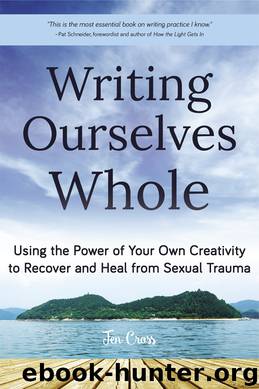Writing Ourselves Whole by Jen Cross

Author:Jen Cross [Cross, Jen]
Language: eng
Format: epub
ISBN: 9781633536203
Publisher: Mango Media
Published: 2017-08-20T16:00:00+00:00
disembodied story
When talking about our body’s stories, we must also consider our disembodied stories. I’m talking about the fragments of memory or possibility that float within us, untethered from the timeline to which we’re able to root most of our memory and sense of self. I’m talking about the stories that are bloodless, have no musculature or veins, are all structure but no bone or emotion or voice. I mean stories that we only stay on the surface of, stories that are porcelain masks, shiny and clean and glaze, with no heartbeat, no mess, no breath.
Much of our early writing will be disembodied. If you grew up in the USA and went to public schools, you were probably trained to take yourself and your body out of your writing. You were trained to keep an “objective” distance from your subject; you were taught that you are not an appropriate subject for intellectual or creative inquiry. You were taught to keep a thick pane of glass between your words and your reactions, emotions, thoughts, and feelings about a subject. You were taught to stick to the facts. You were taught to write in a way that was grammatically correct, technically accurate, clean, clear, concise, dead, dry and boring. Maybe you weren’t able to learn how to do this. Maybe you got so bored, or your assignments were returned to you so bloodied with red pen, that you stopped writing altogether.
Many of us who are trauma survivors write disembodied-ly for another reason—we are detached from this body, this thing that carts our brain around, because we don’t want to have to fully inhabit this crime scene we wear every day. We became so overwhelmed by the cognitive dissonance of having to live in the skin that betrayed us that we found it easier to step outside the confines of this fraught playground, this embattled tangle of cells and neurons and chemical/electrical reactions and sensory input, and just live as much as possible in our heads.
Some of us call this state of being dissociation: we lose time; other selves make time in our bodies when we are no longer present; we are able to see our bodies acting or being acted upon while we feel like we are outside of our own skin. For many of us, the experience of dissociation or disembodiment is less extreme: we are simply not aware of our bodies. We treat our body like an animal we have been given leave to neglect. We don’t sleep enough or we sleep too much; we overfill our bellies; we try not to feel when we’re having sex; we refuse to go to the doctor; we push ourselves hard and harder at the gym or around the track; we try to live on coffee and ramen noodles and bottles of red wine. We abuse what someone else taught us only exists to be abused—the tender eloquence of our very soma.
•§•
For the first years of my writing practice, I stayed with my ritual and routine story: this is what he did to me, these are the details, these are the facts.
Download
This site does not store any files on its server. We only index and link to content provided by other sites. Please contact the content providers to delete copyright contents if any and email us, we'll remove relevant links or contents immediately.
Should I Stay or Should I Go? by Ramani Durvasula(7669)
Why We Sleep: Unlocking the Power of Sleep and Dreams by Matthew Walker(6725)
Fear by Osho(4740)
Flow by Mihaly Csikszentmihalyi(4698)
Rising Strong by Brene Brown(4462)
Why We Sleep by Matthew Walker(4447)
The Hacking of the American Mind by Robert H. Lustig(4383)
How to Change Your Mind by Michael Pollan(4357)
Too Much and Not the Mood by Durga Chew-Bose(4348)
Lost Connections by Johann Hari(4188)
He's Just Not That Into You by Greg Behrendt & Liz Tuccillo(3900)
Evolve Your Brain by Joe Dispenza(3679)
The Courage to Be Disliked by Ichiro Kishimi & Fumitake Koga(3504)
Crazy Is My Superpower by A.J. Mendez Brooks(3400)
In Cold Blood by Truman Capote(3386)
Resisting Happiness by Matthew Kelly(3341)
What If This Were Enough? by Heather Havrilesky(3311)
The Book of Human Emotions by Tiffany Watt Smith(3309)
Descartes' Error by Antonio Damasio(3279)
